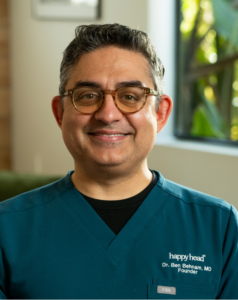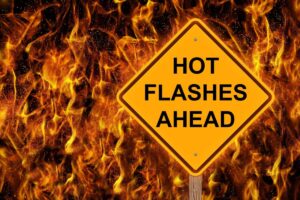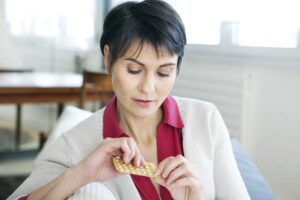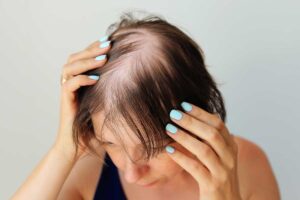This article includes affiliate links. We may earn a small commission if you access Happy Head telehealth services and solutions. The companies we work with are carefully vetted. However, we do not guarantee their products and services.
If you’re noticing thinning hair, receding hairlines, or bald patches as you navigate through the menopause journey, you’re not alone. It’s a common issue that many women face, yet it is rarely talked about openly. The good news is that there are effective hair loss solutions to help, including treatments that target the root causes and can help stimulate hair regrowth.
Understanding Menopause and Its Impact on Hair
At the heart of menopause-related hair loss is a significant shift in hormone levels. As women approach menopause, the body begins to produce less estrogen and progesterone—two key hormones that play an essential role in regulating the hair growth cycle. Estrogen, in particular, is vital for the anagen (growth) phase of hair follicles, helping to keep hair thick, healthy, and growing steadily.
As estrogen levels decline, this vital support is removed, and the hair follicles may become more sensitive to androgens (male hormones), which naturally increase during menopause. One of the most common androgens is dihydrotestosterone (DHT), which has been linked to hair thinning and the miniaturization of hair follicles. This can cause hair to become finer, weaker, and fall out more easily.
Furthermore, the decrease in progesterone, which works to balance the effects of estrogen, can exacerbate the problem by disrupting the delicate balance needed for healthy hair growth. The combined effect of these hormonal shifts can lead to a significant reduction in hair density and volume, with many women noticing thinning across the scalp, particularly around the crown and temples.
Why Does Menopausal Hair Loss Happen?
The hormonal changes that occur during menopause are the primary reason for hair loss during this time, but other factors can also contribute. Genetics, stress, nutrition, and overall health can all influence the rate and severity of hair thinning. Additionally, women may experience a temporary increase in hair shedding due to other menopausal symptoms, such as poor sleep or stress, which can further exacerbate the condition.
While the physical changes to hair during menopause are often inevitable, understanding the underlying causes of hair loss can empower women to take action and seek effective treatments to manage and even reverse thinning hair.
Prescription Ingredients and Treatments to Help Regrow Hair
Fortunately, there are treatments available that can help women regrow their hair and combat the effects of menopause-related hair loss. Many of these solutions focus on addressing the hormonal imbalance and stimulating the hair follicles to encourage new growth.
1. Dutasteride
Dutasteride is a prescription medication that can be effective for menopausal hair loss because it inhibits the enzyme 5-alpha reductase, which converts testosterone into dihydrotestosterone (DHT), a key factor in hair thinning and loss. During menopause, the hormonal changes, including reduced estrogen and an increase in the relative levels of androgens like testosterone, can lead to an increase in DHT, contributing to hair thinning.
By blocking DHT production, dutasteride can help reduce hair loss and potentially stimulate hair regrowth, making it a promising treatment option for women experiencing menopausal hair thinning.
2. Minoxidil
Topical Minoxidil is one of the most widely used and FDA-approved treatments for hair loss, including female pattern hair loss (FPHL) and is available over-the-counter (OTC).
Topical Minoxidil has been proven to increase the size of hair follicles, extend the anagen (growth) phase, and slow the rate of hair shedding.
For women experiencing menopause-related hair loss, topical minoxidil can help restore density and prevent further thinning. In one study, about 20% of women using 5% of Minoxidil achieved up to 25% more hair in 12 weeks. Although it does work for many, you must continue using it indefinitely to maintain the growth you gain.
Topical minoxidil is also available by prescription as custom-made formulations combined with other medications, which can increase hair growth rate more than Minoxidil alone.
3. Spironolactone
Spironolactone is another prescription medication that is often used to treat high blood pressure, but it also has anti-androgenic properties. Since androgens (male hormones like DHT) play a significant role in menopausal hair loss, spironolactone can be effective in reducing the impact of these hormones on hair follicles. By blocking the effects of DHT, spironolactone can help prevent hair thinning and may even promote new growth. It comes in both oral and topical medication options.
Since it can also treat high blood pressure, if you have both hypertension and hair loss, explore if spironolactone might be a good option for you. Some considerations that will be taken into account include kidney or liver disease/dysfunction, adrenal insufficiency, or a history of high potassium levels or other electrolyte imbalances.
Like Minoxidil, there are custom formulations available that involve a combination of another hair growth medication.
4. SuperCapsule®
Happy Head’s 3-in-1 SuperCapsule® is a combination of spironolactone, minoxidil, and essential vitamin D3.
4. Finasteride
Finasteride is a prescription medication that is commonly used to treat hair loss in men, but it is also used off-label for women because it can be beneficial for those who are experiencing menopausal hair loss due to DHT sensitivity.
Similar to dutasteride, finasteride works by inhibiting the conversion of testosterone to DHT, helping to prevent hair follicles from shrinking and producing thinner hair.
While it can be applied topically, it is typically prescribed as an oral medication. However, it can have side effects such as breast pain and reduced libido and cannot be taken by women who could still become pregnant (which is still possible during the perimenopause stage of the journey.)
It can also not be used in situations of breast (and prostate) cancer, liver disease, or mental health and prostate conditions that have not been treated.
Happy Head: A New Option for Hair Regrowth
One of the latest innovations in hair restoration is Happy Head, which offers personalized prescription hair growth treatments that combine FDA-approved ingredients to help regrow hair in only 3 to 6 months. Happy Head’s products are prescribed by board-certified dermatologists and are tailored to meet your individual hair growth goals. By understanding your specific hair loss pattern and concerns, you can receive a customized treatment plan that targets your unique type of hair loss. Whether your hair loss is due to hormonal changes, stress, or other factors, there’s a formulation designed for you.
Learn about the following additional potential clinical treatment options not offered by Happy Head here:
- Ketoconazole
- Menopausal hormone therapy (MHT)
- Platelet-rich plasma (PRP) injections
Taking Control of Your Hair Health
Hair loss during menopause can be emotionally challenging, but it’s important to remember that it’s a common experience that can be managed with the right approach. Whether you choose prescription topical or oral treatments, there are options available to help support healthy hair growth during this transition. Additionally, maintaining a balanced diet, managing stress, and taking care of your scalp can complement these treatments and improve your overall hair health. If you’re experiencing menopausal hair loss, it’s always a good idea to consult with a board-certified dermatologist who specializes in hair loss. They can help you understand your specific needs and recommend the most effective treatment options tailored to your situation.
With the right combination of treatments and self-care, you don’t have to accept hair loss as a permanent part of the menopausal experience. By taking proactive steps, you can regrow your hair and restore your confidence during this transformative time in your life. Remember, you’re not alone on this journey, and with the right support, you can achieve healthier, fuller hair. Embrace this new chapter with positivity and the right tools to overcome any obstacles you may face!

Dr. Ben Behnam, MD FAAD
Co-Founder, Happy Head
Nationally awarded board-certified dermatologist specializing in hair restoration. Recognized as Top 10 Physicians and Surgeons in the US by Newsweek.
You may also like...

LYNKUET: A New Option for Hot Flash Relief
A new non-hormonal medication, LYNKUET™ (elinzanetant) offers relief for women+ who experience menopause-related hot flashes. Learn how it works.

Hormone-Free Hot Flash Relief: 12 Non-Hormonal Medications To Try
Want to beat the heat from hot flashes hormone-free? Try these non-hormonal hot flash medications that are FDA-approved or used off-label.

Menopause Hair Loss 101: What Causes It and 7 Ways To Support Hair Growth
Are you experiencing hair loss, changes in texture, or an itchy scalp? Find out why this is happening and how to manage this menopuase symptom.

